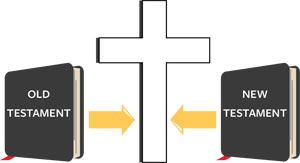The Bible
The Bible was written over a span of 1500 years, by 40 writers all of whom were inspired by God. Unlike other religious writings, the Bible reads as a factual news account of real events, places, people, and dialogue. Historians and archaeologists have repeatedly confirmed its authenticity.
Using the writers’ own writing styles and personalities, God shows us who he is and what it’s like to know him.
There is one central message consistently carried by all 40 writers of the Bible: God, who created us all, desires a relationship with us. He calls us to know him and trust him.
The Bible not only inspires us, it explains life and God to us. It does not answer all the questions we might have, but enough of them. It shows us how to live with purpose and compassion. How to relate to others. It encourages us to rely on God for strength, direction, and enjoy his love for us. The Bible also tells us how we can have eternal life.
Reading the Bible as a new believer can be somewhat overwhelming at first, but when you realize that it is the actual word of God written directly to you it becomes easier to read. The Holy spirit will give you understanding and most always sheds light on exactly whatever is going on in your heart at any given moment. The Bible actually says that it is a living word able to give life.
The Bible is broken up into two parts – the Old Testament and the New Testament. The Old Testament tells the story of creation and the history of God’s people. The New Testament tells the story of Jesus and the history of the early church. Believers of the Old Testament times looked forward to the coming of their Messiah. New Testament believers look back to the cross and the resurrection. Both of these events culminate in the unique person of Jesus Christ.

Everything you need to grow in your walk with God can be found in these pages. It’s not only an instruction manual but also a love letter speaking directly to your heart. If you’ve never read the Bible before there are various translations. Some use more formal wording than others. But the differences are minor. If you have a Bible, use it. You don’t need a particular one.
I will be using the New King James Version (NKJV). But NIV, ESV, NAS, or many others are just fine. Stay away from versions that try and put a modern twist on the Bible – like The Message or The Passion Bibles which leave out key parts that are very important.
If you want to use a Bible online, here is a great resource for various translations and even audio versions: https://www.bible.com or the app: https://www.bible.com/app
*Just so you know, “John 1:3-4” means, the book of John, chapter 1, verses (sentences) three and four. It’s just a way of notating the chapters and sentences, so you can quickly find something.
A good place to start is the New Testament with the book of John (the life of Jesus) or the book of James (which explains christian living), and in the Old Testament with the book of Psalms. Sometimes certain things might not be clear unless you go back to the Old Testament to find out what they are referring to…in this case I recommend starting a bible reading plan that can help digest the entirety of both books. Here is a great plan: https://www.bible.com/reading-plans/29244-bioy-2022-en